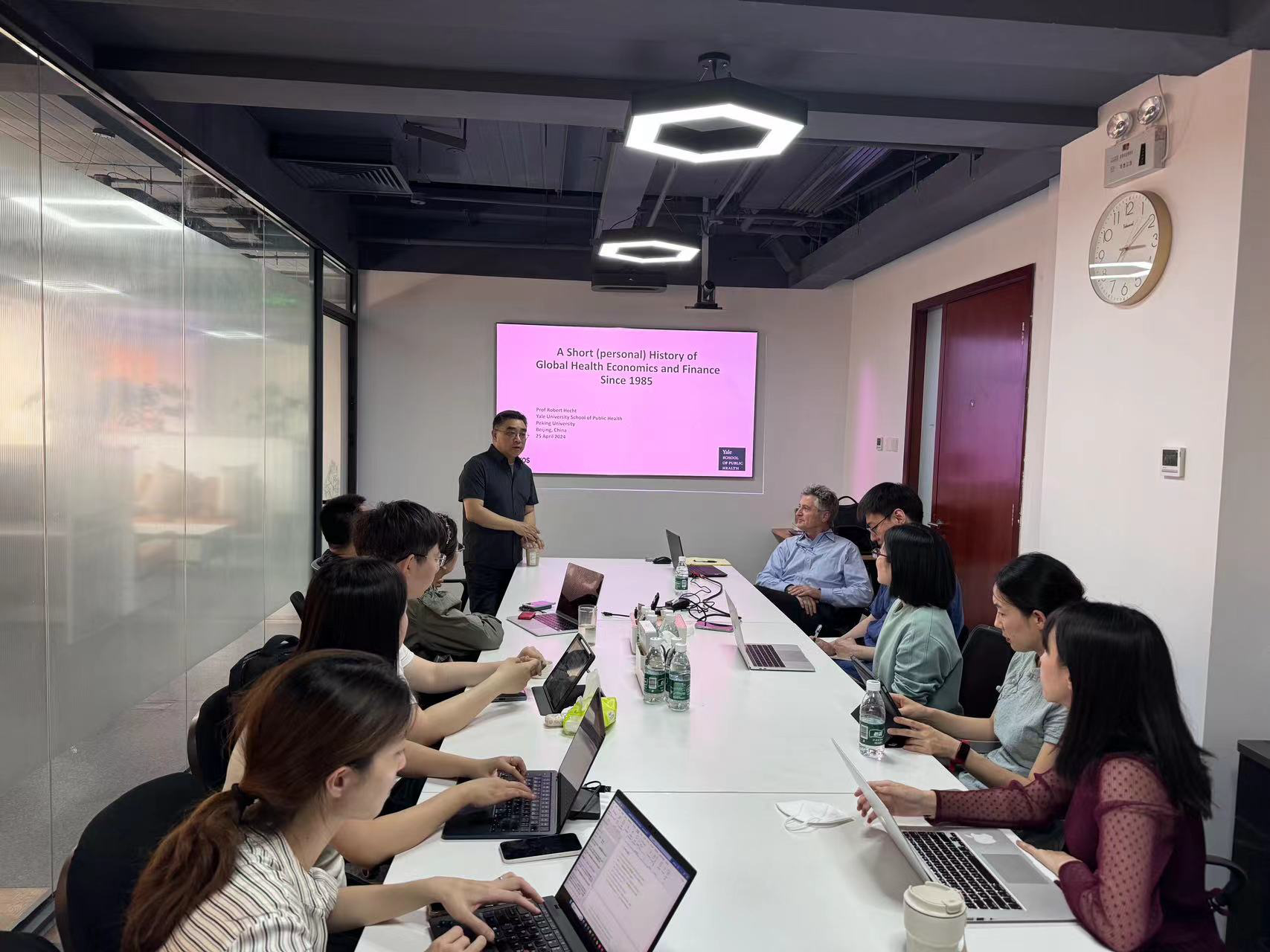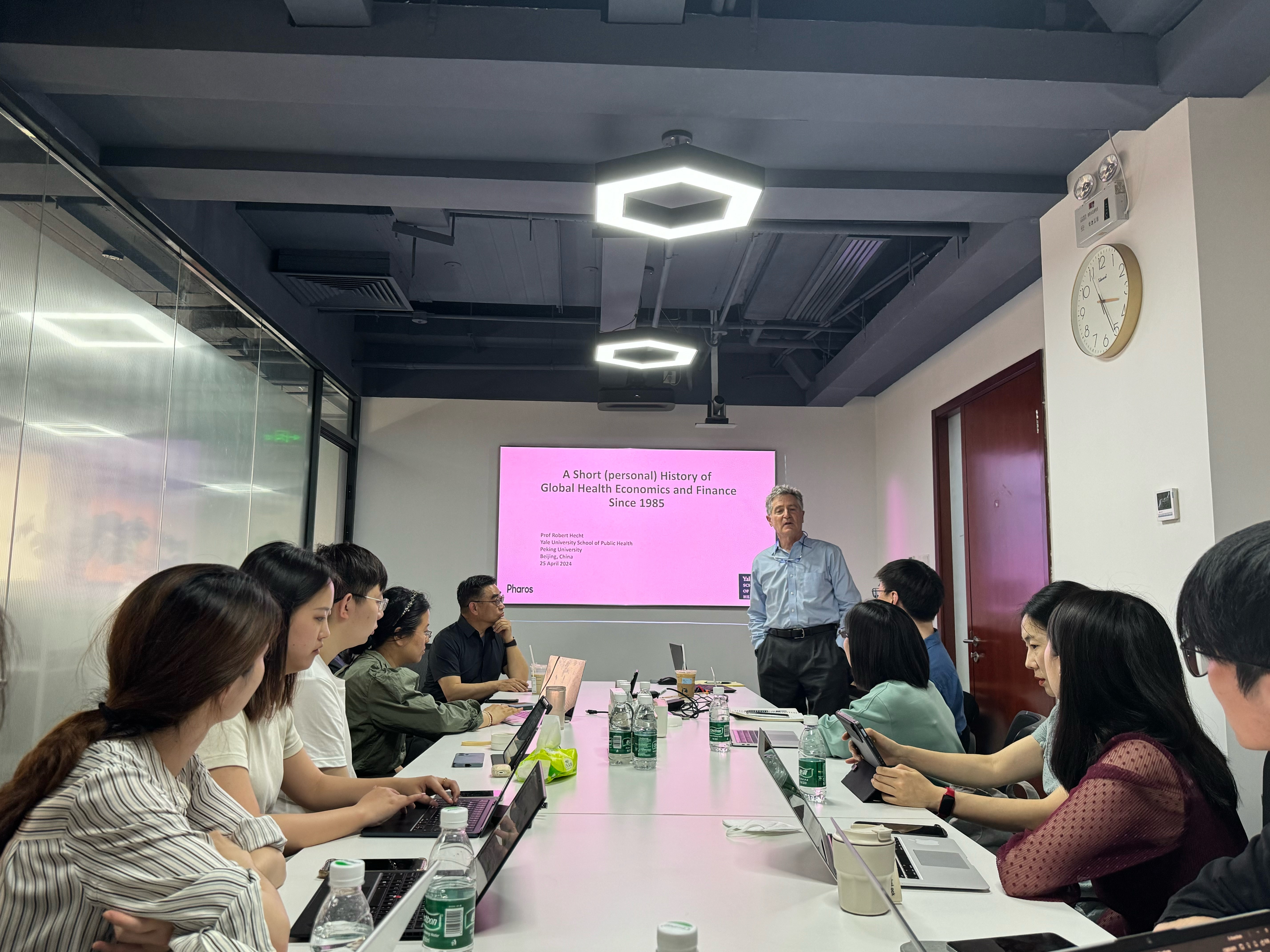On April 25, 2024, Professor Robert Hecht from the Yale School of Public Health visited the Institute for Global Health and Development (GHD) at Peking University. He delivered a lecture called "A Short History of Global Health Economics and Finance Since 1985" to the faculty and students. The lecture was hosted by Professor Liu Guoen, Director GHD and Boya Distinguished Professor at the National School of Development, Peking University.

Professor Hecht began by sharing his personal experiences, detailing his early career at the World Bank. He recounted his work in various countries and regions, including Africa, Latin America, and Asia, where he played a significant role in promoting healthcare reforms and establishing national health insurance systems. Hecht proposed dividing the history of global health economics and finance into five eras: the Stone Age, the Bronze Age, the Iron Age, the Golden Age, and the Modern Age. He elaborated on the characteristics of each era, citing key literature and examples to systematically explain the role and actions of economics and finance in the global health field.
Regarding the "Stone Age" (1980s), Hecht reviewed the primitive and fragmented state of global health economics and finance during this period. He mentioned Arrow's article, which highlighted the uncertainties in the healthcare market.
Moving into the "Bronze Age" (1990-1994), the field began to awaken and innovate. Hecht emphasized the milestone of the World Bank's 1993 World Development Report , which formally introduced the concept and measurement of disease burden for the first time. This report marked the beginning of significant attention to disease burden research. In 1996, the World Health Organization, in collaboration with the Harvard School of Public Health and the World Bank, released the first edition of The Global Burden of Disease . The attempt to combine disease burden with cost-effectiveness analysis to identify priorities and assess potential impacts was a major development of this era.
The "Iron Age" (1995-2005) signaled a period of vigorous healthcare reform at the national level, particularly in post-Soviet Europe and Latin America. Building on the 1993 World Development Report and Harvard's research outcomes, there was a strong push towards universal health coverage systems with social health insurance. Efforts were focused on exploring effective ways to optimize health insurance payment methods to incentivize providers and payers to improve performance and control costs.
The "Golden Age" (2000-2010) was characterized by the rapid expansion of infectious disease control initiatives led by global health objectives, the World Bank, the governments of the UK and US, and the Gates Foundation. During this decade, developing countries saw a significant increase in health aid funding, leading to substantial progress in areas such as HIV/AIDS prevention and immunization programs.

Lastly, Professor Hecht discussed the "Modern Age" (2010 to present), describing it as a period of diverse development but fraught with challenges. He pointed out that while efforts were made to sustain the momentum from the Golden Age, the global health field faced dual challenges from aid fatigue and political conservatism. He emphasized the importance of achieving Universal Health Coverage (UHC) and outlined a grand vision for convergence in epidemiological conditions, priority setting, and the provision and financing of health services across countries by 2035.
In the concluding segment, Professor Hecht identified potential new issues and opportunities in the field of global health economics and finance:
1 Stagnation in global health coverage: This might require a reassessment of insurance and risk pools.
2 Control of disease risk factors: More incentives and tax policies are needed to address risk factors like smoking and alcohol consumption.
3 Efficiency of health development aid: Issues concerning the transition from international aid to domestic financing.
4 Focus on new priorities: Attention to cost-effective surgeries, low-cost preventive measures for cardiovascular diseases, treatment of hepatitis, and cancer.
The lecture provided a comprehensive discussion on the development of global health economics and finance since the 20th century, encompassing both historical retrospectives and unique insights into future trends. Following the lecture, Professor Hecht engaged in an in-depth discussion with GHD faculty and students.
(Interpreted by Waverly Shi)